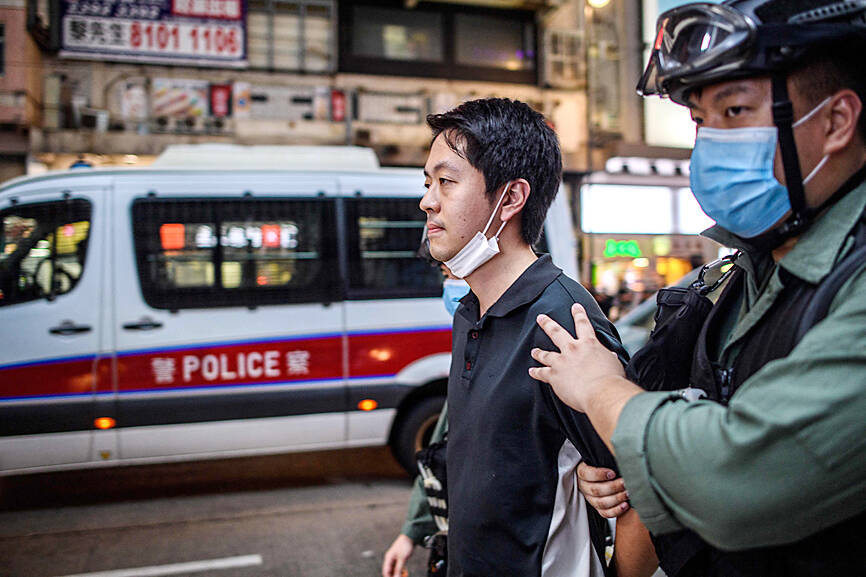Hong Kong pro-democracy activist Ted Hui (許智?) has been granted asylum in Australia, the former lawmaker said on Saturday, more than four years after he left Hong Kong, where he faces criminal charges over the 2019 pro-democracy protests.
Hui said he received written notice from the Australian Department of Home Affairs on Friday approving his claim, and that his wife, children and parents were also granted visas.
“When people around me say ‘congratulations’ to me, although I politely thank them, I can’t help but feel sad in my heart. How to congratulate a political refugee who misses his hometown?” he posted on Facebook.

Photo: AFP
“If it weren’t for political persecution, I would never have thought of living in a foreign land. Immigrants can always return to their home towns to visit relatives at any time; Exiles have no home,” he wrote.
The home affairs department did not immediately respond to e-mailed questions sent after business hours.
The Hong Kong government said in a statement it was “against the harboring of criminals in any form by any country.”
The Chinese Ministry of Foreign Affairs did not respond to questions about the decision.
Australian Prime Minister Anthony Albanese visited Beijing last month as part of his administration’s years-long push to improve ties with China.
A former Democratic Party lawmaker, Hui left Hong Kong in late 2020 after facing criminal charges over the 2019 pro-democracy protests.
In 2023 Hong Kong accused him and seven others of national security offences, including incitement to secession, and put HK$1 million (US$130,000) bounties on their heads.
Fellow Hong Kong activist Tony Chung (鍾翰林) yesterday said he had been granted asylum by the UK, in a post on his X account.
He was sentenced to three years, seven months in prison in late 2021 after being convicted of secession and money laundering.
Pro-democracy businessman Jimmy Lai (黎智英) is on trial in Hong Kong on charges related to a national security law imposed by Beijing and alleged sedition.

Indonesia yesterday began enforcing its newly ratified penal code, replacing a Dutch-era criminal law that had governed the country for more than 80 years and marking a major shift in its legal landscape. Since proclaiming independence in 1945, the Southeast Asian country had continued to operate under a colonial framework widely criticized as outdated and misaligned with Indonesia’s social values. Efforts to revise the code stalled for decades as lawmakers debated how to balance human rights, religious norms and local traditions in the world’s most populous Muslim-majority nation. The 345-page Indonesian Penal Code, known as the KUHP, was passed in 2022. It

‘DISRESPECTFUL’: Katie Miller, the wife of Trump’s most influential adviser, drew ire by posting an image of Greenland in the colors of the US flag, captioning it ‘SOON’ US President Donald Trump on Sunday doubled down on his claim that Greenland should become part of the US, despite calls by the Danish prime minister to stop “threatening” the territory. Washington’s military intervention in Venezuela has reignited fears for Greenland, which Trump has repeatedly said he wants to annex, given its strategic location in the arctic. While aboard Air Force One en route to Washington, Trump reiterated the goal. “We need Greenland from the standpoint of national security, and Denmark is not going to be able to do it,” he said in response to a reporter’s question. “We’ll worry about Greenland in

PERILOUS JOURNEY: Over just a matter of days last month, about 1,600 Afghans who were at risk of perishing due to the cold weather were rescued in the mountains Habibullah set off from his home in western Afghanistan determined to find work in Iran, only for the 15-year-old to freeze to death while walking across the mountainous frontier. “He was forced to go, to bring food for the family,” his mother, Mah Jan, said at her mud home in Ghunjan village. “We have no food to eat, we have no clothes to wear. The house in which I live has no electricity, no water. I have no proper window, nothing to burn for heating,” she added, clutching a photograph of her son. Habibullah was one of at least 18 migrants who died

Russia early yesterday bombarded Ukraine, killing two people in the Kyiv region, authorities said on the eve of a diplomatic summit in France. A nationwide siren was issued just after midnight, while Ukraine’s military said air defenses were operating in several places. In the capital, a private medical facility caught fire as a result of the Russian strikes, killing one person and wounding three others, the State Emergency Service of Kyiv said. It released images of rescuers removing people on stretchers from a gutted building. Another pre-dawn attack on the neighboring city of Fastiv killed one man in his 70s, Kyiv Governor Mykola